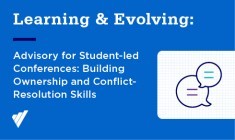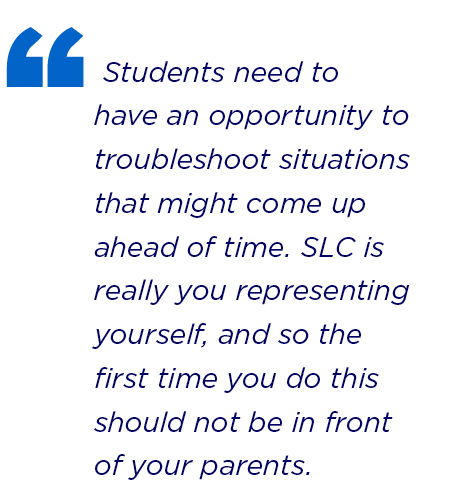Advisory for Student-led Conferences: Building Ownership and Conflict-Resolution Skills

In response to a pattern of decreasing student achievement, the New Visions Charter High School for Advanced Math and Science IV (AMS IV) launched their first advisory program in fall 2021, and developed student-led conferences. This approach helped students not only reflect on their academic journeys, but develop the skills to explain their choices and articulate future plans with and to the adults in school and at home.
During the summer of 2021, AMS IV conducted their annual review of the rises and falls in students’ GPAs and attendance from the past school year, and set a goal to improve both. Assistant Principal Lendonna Thomas knew reaching this goal could only be possible if students recognized their agency over their learning journey and built the skills necessary to reflect and plan towards growth. To increase student ownership, AMS IV therefore developed an advisory approach that included several key aspects: a focus on preparing students for student-led conferences and collaborative planning by teachers.

Launched for the first time in fall 2021, advisory at AMS IV seeks to ensure that every student at each grade level has a relationship with a trusted adult at school who knows and supports them toward their goals. Consequently, each teacher at AMS IV serves as an advisor for 10 to 12 students in their grade level. Students receive a weekly email reminding them of their current grades, and during advisory, students create an action plan to improve those grades. This action plan includes setting SMART goals, or goals that are specific, measurable, achievable, relevant, and time-bound. The plan also includes self-advocacy steps toward reaching those goals, like asking specific teachers for help during set times, or requesting extended time.
Additionally, advisors check-in with individual students informally throughout the week to make sure they are completing work on time, attending classes, and studying. Advisors are also tasked with supporting students socially and emotionally, and so make sure to address any non-academic needs or concerns students may have during these informal check-ins. They then document what they learn from check-ins on a shared Google doc.
Although advisory was originally planned to include two group meetings a week — one focusing on academics and college-readiness, and one on social-emotional learning — teachers soon found they needed more time to communicate with families, attend to administrative duties, and meet with students one-on-one. In response, they switched to meeting once a week, maintaining the academic goal-setting routines with students but with a concerted focus on helping students prepare for a newly launched initiative: student-led conferences.

For many schools, family-teacher conferences with students are a time when teachers update families on students’ academic progress and classroom behavior, and present a plan for the next steps students should take to reach learning goals. But for the educators at AMS IV, it was important for students rather than teachers to take the lead during conferences so that they were more deeply meaningful for students. Doing so engages students in deep reflection about the way they learn and think, and pushes them to identify and recognize their individual strengths, strategies, and areas of growth. Leading their own conference fosters ownership over their learning journey, and presents the opportunity for them to vocalize what they need in order to reach the goals they define.
Student-led conferences (SLCs) occur two times per year at AMS IV: midway through fall and spring, advisors meet with families to review students’ progress reports. Then, at the end of each semester, during an SLC, students present their academic work in a slideshow to their advisor and family, answer questions, and explain their thinking and learning. To ensure all students follow a similar SLC structure, Thomas developed a curricular arc for all advisors to follow and adapt, including a conference slides template for students, resources and references, and a script scaffold to get students started. Thomas makes it clear, however, that “everyone has their own way of designing”, and that advisors should encourage students to personalize their presentations and fold in language that revolves around self-advocacy and reflection. To this end, the student script includes space for them to not only establish SMART goals, but also discuss their mental health, a conversation Thomas says must be dovetailed with those around academics. Because SLCs include such detailed points about students’ thinking, academics, and goals, and are meant to engage in adult conversations about their lives, Thomas notes that students spend roughly one to two months preparing and practicing in advisory.

During the first round of SLCs at the end of the fall 2021 semester, which were virtual, Thomas noticed that many students found themselves engaged in difficult conversations with their families. For example, some students and caregivers had different expectations for a student’s academic progress, and the SLC was the first time these differences surfaced. Students who were not prepared to talk through these differences struggled to complete the conversation.
Recognizing that SLCs are so personal and vulnerable, Thomas wanted to make sure that students moving forward not only composed a thorough slide deck and practiced academic speaking points, but were prepared to face any challenging conversations that may arise in response. Developing conflict-resolution skills in a safe and supportive environment would prepare students to face future tensions in the world once they leave high school.

To prepare students for potential tensions during SLC, Thomas reflected on the notes she took during the first round of SLCs, and took stock of how challenging reactions from adults – like disappointment, anger, and sadness – unfolded. She then created imaginary scenarios based on her noticings, and included them as part of the SLC curricular arc so students could practice encountering and addressing them in advisory.
“The purpose of the scenarios is to give them the opportunity to experience a situation before it happens, because when it happens on the spot, it’s hard to know what to do,” said Thomas.

While reflecting, preparing, and practicing presentations takes a huge amount of time, AMS IV’s SLC-focused advisory has come to combine academics and SEL in a meaningful way thanks to the ongoing collaboration between teachers. Bi-weekly, grade-level meetings are a time when, as Thomas says, teachers “elevate our concerns about students”, and look for trends that could inform upcoming advisory lessons. During these meetings, teachers discuss individual students, drawing from several points of information: 1) the Google Doc, where teachers post short summaries about their check-ins; 2) a grade-level Google Chat, where teachers share real-time noticings, updates, and questions about students, sometimes prompting another teacher to initiate an urgent conversation with an advisee; 3) weekly email updates about which of their advisees are passing and failing classes. Teachers then identify next steps for individual students, whether it is more check-ins or specific scaffolds for their SLC. Students who are consistently failing a class, for example, are required to attend study hall, but may also receive other, personalized support depending on their situation.
Teachers also discuss critical trends across advisory groups, which inform the advisory lessons created and disseminated by two advisory teachers at each grade level. And, importantly, these meetings shape the way individual teachers respond to and support individual students, greatly impacting not only their academic relationships, but their interpersonal relationships too. For Thomas, while advisory requires so much of her and her team’s consideration and attention, the hard work is well worth the pride she says students now take in their learning and growth.
“Students have started advocating on their own about their work,” said Thomas.

Thomas looks forward to continuing SLCs, with the hope that student-led practices will expand to other areas of AMS IV as well.